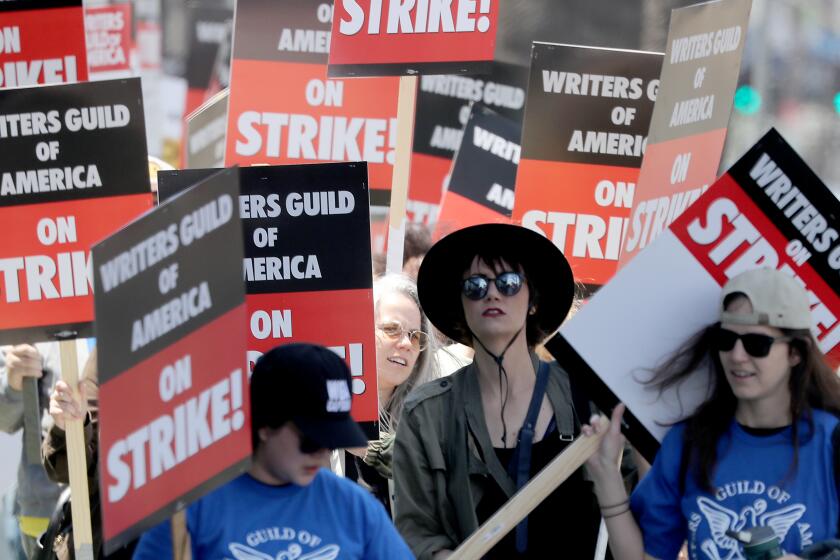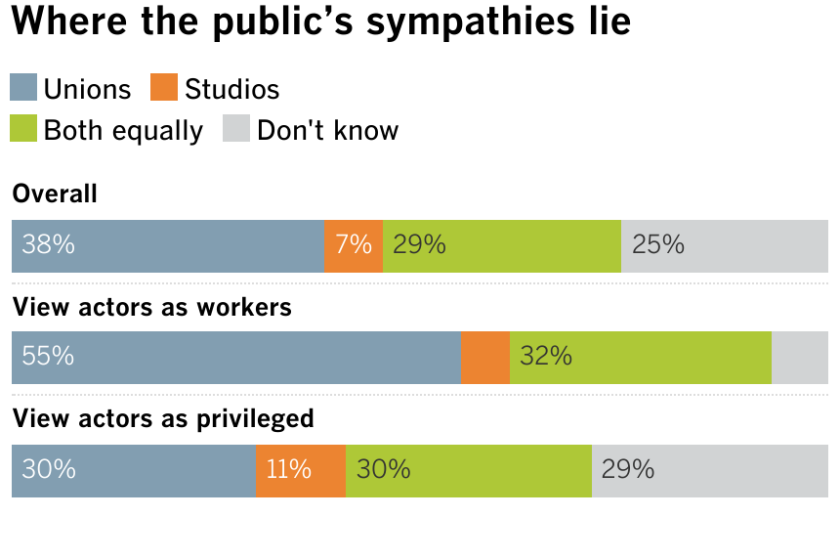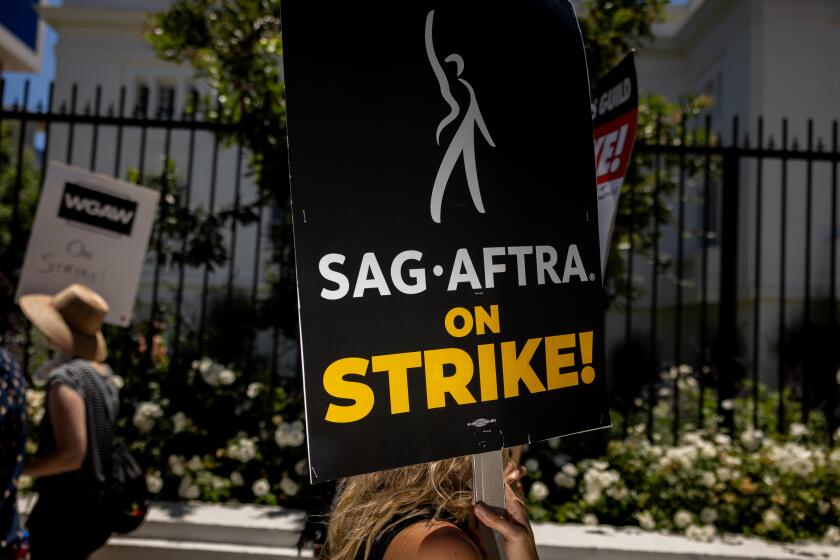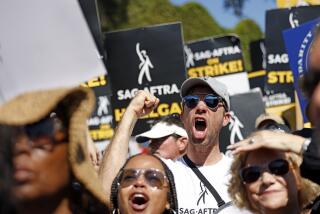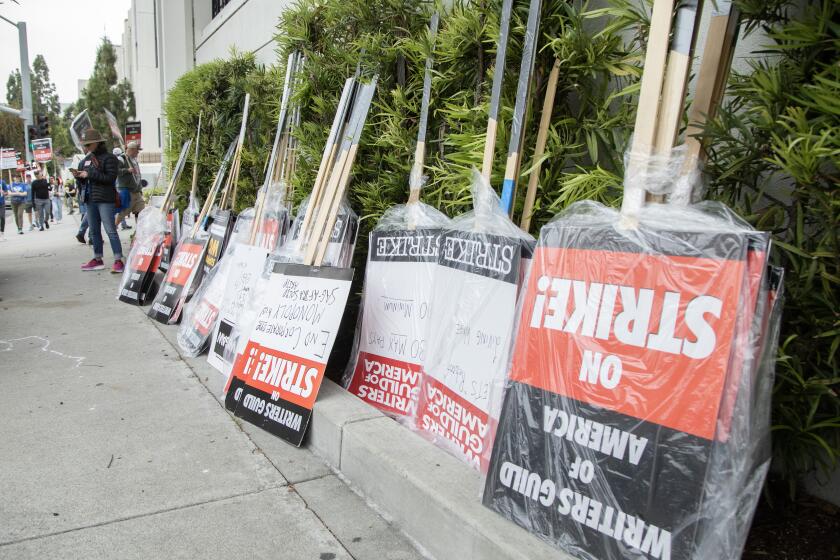WGA and studio reps meet, but no signs of strike ending
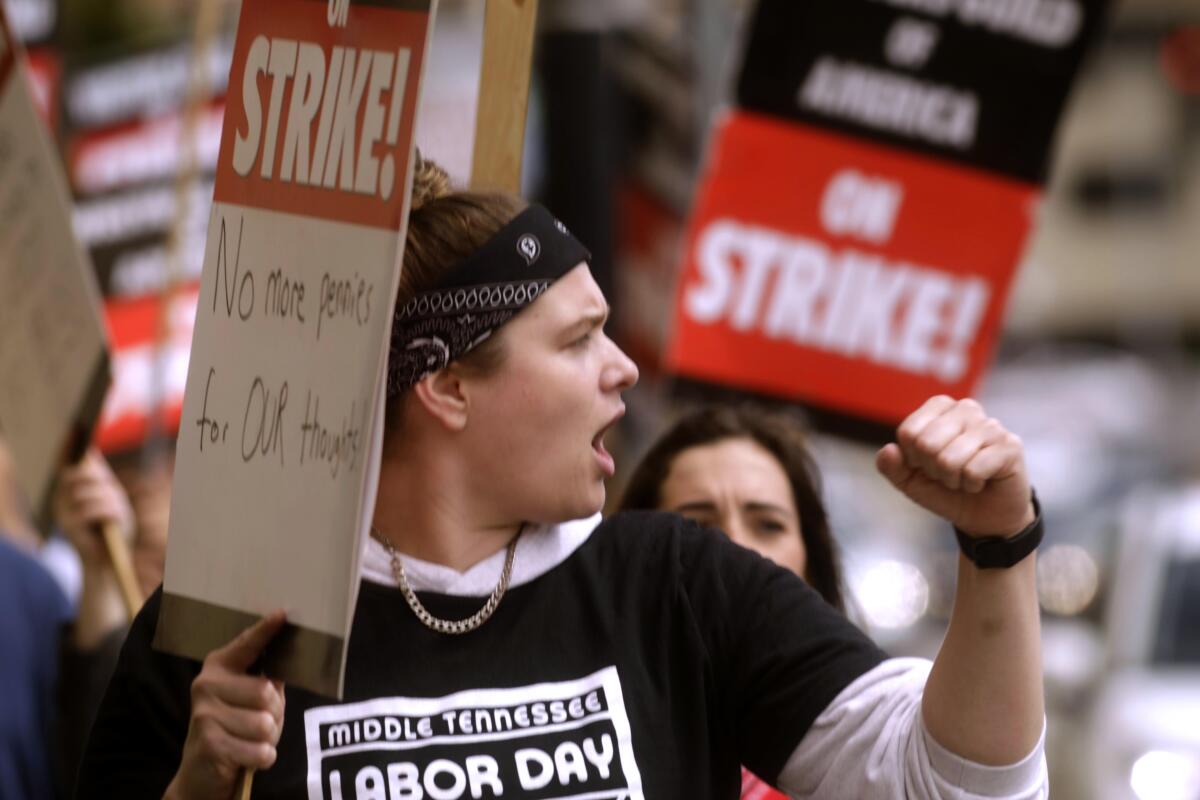
Representatives of the Writers Guild of America and the major studios met Friday afternoon for the first time in three months, but there were no signs of a breakthrough in the months-long labor standoff that has upended Hollywood.
Hopes were raised in the entertainment industry when the WGA said it received a request from Carol Lombardini, president of the Alliance of Motion Picture and Television Producers, to meet on Friday to discuss negotiations. The alliance bargains on behalf of Walt Disney Co., Warner Bros. Discovery, Netflix, Apple TV+ and other media companies and streamers.
But in a note to members Thursday afternoon, WGA leaders dampened expectations of a resolution to the strike and expressed skepticism over the AMPTP’s intentions, noting during the 2007-08 strike both sides restarted negotiations only to break apart for a second time.
The 2023 writers’ strike is over after the Writers Guild of America and the Alliance of Motion Picture and Television Producers reached a deal.
“We won’t prejudge what’s to come,” the WGA negotiating committee said. “But playbooks die hard. So far, the companies have wasted months on their same failed strategy. They have attempted, time and time again, through anonymous quotes in the media, to use scare tactics, rumors and lies to weaken our resolve.”
In response, AMPTP called the WGA’s bargaining committee’s rhetoric “unfortunate.”
“This strike has hurt thousands of people in this industry, and we take that very seriously,” AMPTP said in a statement on Thursday. “Our only playbook is getting people back to work.”
A new L.A. Times poll on Hollywood’s double strike finds the public is more likely to support striking actors and writers than studios and streaming services. But many express ambivalence.
But sources close to the negotiations who were not authorized to comment said that Friday’s meeting did not go well and that there was little progress in resolving deep differences between the two sides.
The session ended with the parties agreeing to go back to their respective camps to evaluate options. It wasn’t clear if and when talks might resume.
The AMPTP and the WGA declined to comment.
In an email to members late Friday evening, the WGA accused the alliance of violating a press blackout and said it was unwilling to address key guild demands, such as the preservation of the writers’ room or “success-based residuals.”
“Your committee remains willing to engage with the companies and resume negotiations in good faith to make a fair deal for all writers,” the union said. “But rest assured, this committee does not intend to leave anyone behind, or make merely an incremental deal to conclude this strike.”
Fighting a labor battle on two fronts — actors joined writers on picket lines three weeks ago — is increasingly costly for the major media companies, which also face pressure to resolve a conflict that has hammered Los Angeles’ high profile entertainment economy.
L.A. Mayor Karen Bass called Friday’s meeting “an encouraging development.”
“The economic conditions of the entertainment industry are changing -- and we must react and evolve to this challenge,” Bass said in a statement. “It is critical that this gets resolved immediately so that Los Angeles gets back on track and I stand ready to personally engage with all the stakeholders in any way possible to help get this done.”
Writers went on strike May 2. They are seeking increased compensation, a larger share of residuals from streaming platforms and regulations over the use of artificial intelligence, among other issues.
Picketing writers on Friday expressed cautious optimism over the meeting with the AMPTP, saying they viewed it as positive step while stressing their resolve to continue striking if necessary.
“I didn’t picket for over three months just for incremental change,” said showrunner Marc Guggenheim, who was picketing outside the Walt Disney Studios lot in Burbank on Friday. “We voted for a strike because we’re hoping for systemic change and I think writers are willing to stay out on the picket line as long as it takes to get that systemic change.”
Screenwriter Joshua Allen Griffith, who was helping organize the pickets outside Sony Pictures in Culver City, said guild leaders have been careful to try to temper the expectations of members.
“I’ve been telling my team members that past behavior predicts future behavior and that there is a high possibility that talks will break down again,” said Griffith, a WGA strike captain whose credits include Hulu’s series “Only Murders in the Building.”
“It’s important to have hope — and we have reason to have hope — but it would be a real shame if our expectations were too high,” Griffith said. “I hope we will continue to stick together despite any disappointments.”
Some expected the alliance might first reach out to SAG-AFTRA, whose members have been on strike since July 14 over similar issues.
But after SAG-AFTRA President Fran Drescher’s fiery remarks to rally her members last month, media executives felt that emotions were running too high to immediately restart talks, according to people familiar with the matter who were not authorized to comment.
“Maybe the temperature is a little too warm in terms of that relationship right now,” said David Smith, a professor of economics at Pepperdine University’s Graziadio Business School. “Maybe that needs to cool off a little bit before they’re going to be anxious to talk to SAG-AFTRA.”
SAG-AFTRA negotiators also were furious over a remark made by a top AMPTP negotiator on July 12 during the last bargaining session before the performers’ contract expired.
That person told SAG that the companies would return to the bargaining table when the actors began “acting civilized,” said chief negotiator Duncan Crabtree-Ireland and actor Joely Fisher.
A Times survey tallies the paydays for the heads of Warner Bros. Discovery, Netflix and more. The issue has become a hot topic on picket lines during the writers’ strike.
Amid the acrimony, media executives concluded they might have a better shot with WGA’s leadership, particularly since that union’s members have been walking picket lines since early May. Several showrunners also have encouraged company CEOs to get the AMPTP back to the negotiating table, sources close to the studios said.
But company executives have said privately that the WGA will have to abandon demands for minimum staffing of writers rooms and the length of writers’ contracts in order to achieve a deal. Executives have suggested a possible compromise, but the companies do not want writers dictating how many people are needed to write a television show, according to a person close to the negotiations.
The sides also have wrangled over streaming viewership transparency and the payment of higher residuals for successful streaming shows. That issue continues to be a key sticking point, the person said.
Company executives have been troubled by SAG-AFTRA’s demand that actors on popular shows be paid 2% of a streamer’s revenue.
The proposal is unworkable, people on the AMPTP side have said, pointing out that there are plenty of shows that don’t work. They also have rejected SAG-AFTRA’s suggestion that payments be based on data from the research firm Parrot Analytics, noting that Parrot doesn’t measure viewership only interest or impressions in a program.
For their part, SAG-AFTRA negotiators have said they are not wedded to Parrot, but that they made the suggestion as a way to open the dialogue on having some third party determine which shows are most popular. Currently, actors complain that they don’t sufficiently share in the revenue from hit shows on streaming platforms.
Actor Blake Worrell said that he hopes that talks can resume.
“I don’t think anyone wants this to continue,” Worrell said Friday at the picket outside Sony. “But at the end of the day, this is about equal rights, fair pay and being recognized for our work.”
SAG-AFTRA has approved a deal from the studios to end its historic strike. The actors were on strike for more than 100 days.
More to Read
Inside the business of entertainment
The Wide Shot brings you news, analysis and insights on everything from streaming wars to production — and what it all means for the future.
You may occasionally receive promotional content from the Los Angeles Times.
